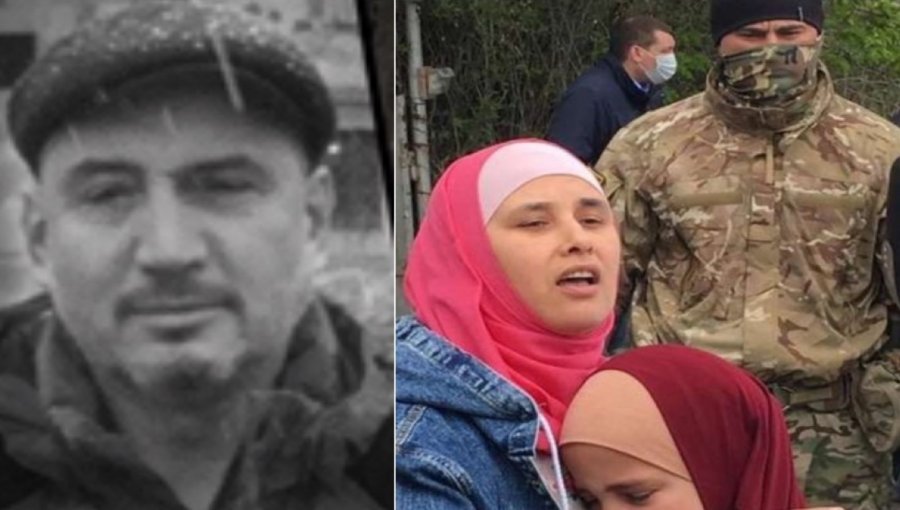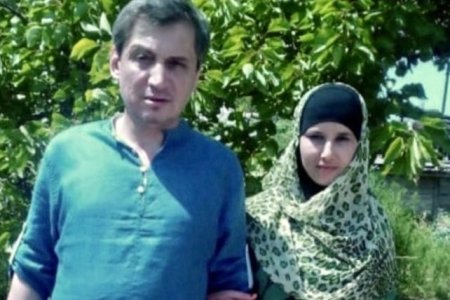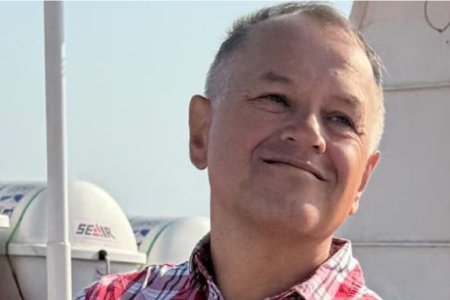
A Russian court is about to begin the ‘trial’ of Nabi Rakhimov, 13 months after the Uzbek refugee was killed by the Russian FSB in occupied Crimea. There are no grounds for believing that any charges had been laid before Rakhimov was killed, and the only ‘witnesses’ in this surreal ‘trial’ will be the Russian enforcement officers who killed him and who later refused to hand his body over to the family to be properly buried.
It was initially announced in December 2021, eight months after Rakhimov was killed, that Russia was ‘charging him’ with ‘using force against representatives of the authorities who were carrying out their duties’ (Article 318 of Russia’s criminal code). It was claimed that Rakhimov was killed in this alleged ‘confrontation’.
On 18 May 2022, Rakhimov’s widow Sokhiba Burkhanova was presented with the indictment against her late husband. The Russian prosecutor would seem to have felt that one charge against a dead man was insufficient and has come up with eight charges from Russia’s criminal code. These are: ‘an attempt on the life of an enforcement officer (Article 317); various parts of Article 222 on supposed firearms charges; several parts of Article 30 (on planning or attempting to commit a crime); Article 205.5 § 1 (organizing the activities of a terrorist organization) and Article 205.1 (‘helping a terrorist organization’). The so-called ‘terrorist organization’ in question is, presumably, Hizb ut-Tahrir, a peaceful pan-Muslim organization which is legal in Ukraine and is not known to have committed acts of terrorism anywhere in the world.
The first ‘hearing’ in this surreal event has been scheduled on 21 June at the Southern District Military Court in Rostov-on-Don, a court which has become notorious over the past eight years for its role in the persecution of Ukrainian political prisoners. Lawyer Edem Semedlyaev reports that the judge, Mikhail Nikitin, has decided to do without a preliminary hearing, which is usually about practical issues, including the detention of the defendant. Since the defendant was killed before any charges were laid, it remains to be seen how long this ‘trial’ will be dragged out.
Up till 11 May 2021, Nabi Rakhimov was living peacefully in occupied Crimea, with his wife Sokhiba Burkhanova, and their two youngest children - 11-year-old Mariam and her 15-year-old brother Takiuddin. Nabi Rakhimov had first gone to Russia, fleeing religious persecution in his native Uzbekistan for alleged involvement in Hizb ut-Tahrir. Russia reacted in 2013 by detaining him, pending forced deportation to Uzbekistan. Helped by human rights lawyers, Rakhimov applied to the European Court of Human Rights which , in its judgement in the Case of Rakhimov v. Russia (which became final in December 2014, ruled that Russia’s had violated Rakhimov’s rights. The Court also expressly prohibited Russia from extraditing him to Uzbekistan.
Russia had not previously flouted this prohibition, and there was no reason for Rakhimov to have believed that it would deport him from Russian-occupied Crimea.
It could, however, also imprison him. In 2003, Russia’s increasingly politicized Supreme Court declared Hizb ut-Tahrir to be ‘terrorist’. No explanation was provided and the ruling was passed in secret, making it impossible for the organization and human rights lawyers to lodge an appeal. Since its invasion and annexation of Crimea, Russia has been using this ruling to prosecute Crimean Muslims, in particular Crimean Tatar civic journalists and activists, with men sentenced to up to 20 years, without any crime at all.
It is possible that the Russian FSB could have been arriving to arrest Rakhimov on Hizb ut-Tahrir charges on 11 May 2021. There was, however, no reason to believe that Rakhimov, a devout Muslim awaiting the end of the Holy Month of Ramadan, would have attempted any violent resistance.
Armed officers had already burst into the house where Rakhimov’s wife and younger two children were living. They do not appear to have produced any warrant, and illegally refused (as always) to allow the lawyers who swiftly arrived to be present. Sokhiba Burkhanova was taken away, first to the migration service, then for questioning, with her 15-year-old son Takiuddin insisting on going with her.
Tragically, Rakhimov was alone in the house in a neighbouring village that he was building to earn money for the family. There had reportedly been signs of surveillance and the FSB were doubtless aware that they would find Rakhimov alone. Had Rakhimov really died of gunshot wounds, there would be no reason for the secrecy and refusal to allow the religious burial of a man against whom criminal proceedings were first mentioned only after his violent death.
Sokhiba Burkhanova learned that her husband was dead only when an officer pushed a photo in front of her and demanded that she recognize the man they had killed. A Russian-controlled ‘court’ then ordered her detention in a migrant unit in Krasnodar (Russia), pending forced deportation to Uzbekistan. On 27 May, the European Court of Human Rights applied Rule 39, preventing Russia from forcibly sending Burkhanova to Uzbekistan where she too would face persecution. She has been effectively imprisoned ever since in the appalling conditions of the Krasnodar holding unit for so-called illegal migrants, and with Russia now having withdrawn from ECHR in connection with its total invasion of Ukraine, she is in danger of being forcibly returned to Uzbekistan.



